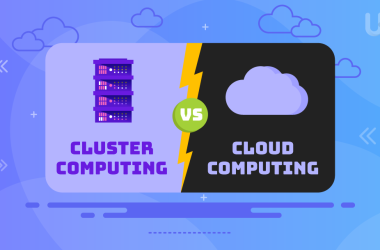The role of data storage and access cannot be underestimated in our digitalized world. With information processes going digital almost entirely, the demand for accessible and secure storage has grown substantially. With all the diversity of choices, cloud storage appears to be a revolutionary technology with its unique flexibility, scalability, and usability features.
In this article, we will explore the cloud storage phenomenon in detail, covering its type, how it works, and the benefits it brings. Whether you are a fan of technology, a businessman, or just interested in all things digital, having some insight into cloud storage nowadays is a must. Let’s get started!
What is Cloud Storage?
Cloud storage is a technology that involves digital files being saved on remote servers that are operated and managed by a provider. The provider is responsible for storing, managing, and securing the data, and it maintains a direct internet linkage that allows users to access the data stored across the infrastructure.
Cloud storage benefits companies through access to data storage, retrieval, and control facilities without the need to establish or operate a data center of their own. This business model transformation is advantageous as it transitions the financial requirements from a capital expenditure to an operating cost structure.
In addition to the model shift, cloud storage is scalable, allowing businesses to adjust their storage capabilities based on their data requirements. Google Cloud provides numerous tailored options that allow businesses to scale their cloud storage requirements to suit an organization.
How Does Cloud Storage Work?

Cloud storage is the use of a virtualized data center to offer users and applications a virtual storage space based on individual application requirements. Cloud storage, which is usually executed using a web-based Application Programming Interface (API), is a remote cloud storage API linked to a company’s internal cloud storage infrastructure.
It includes at least one data server consumers may access online. The user uploads a file to this managed data server, which then transmits the information across several different servers. During this phase, the file is transferred across the Internet. After that, the data stored on servers is made accessible via a web-based API.
Cloud storage offerings use many data servers to keep data available at all times. This redundancy allows users to be certain that their data has been shifted to another server during server maintenance without losing access to it.
Embrace Cloud Storage Excellence with Storage VPS!
Looking to elevate your data management? Store massive amounts of information or files on UltaHost’s SSD storage. Get a large amount of bandwidth for your data and fast throughput accessibility.
Types of Cloud Storage
Cloud services provide an opportunity for people to store data. Suppose all data is stored digitally and can be accessed from anywhere. It would be like having a virtual hard drive that played a role in enabling it, from storing necessary documents like Word files and videos to utilizing the cloud to store and process complex data or applications. However, picking the right type of cloud storage is tunnel-visioning without a clear view of what one’s use case or use cases will be. Thus, the following definitions of the types of cloud storage can assist in the determination:
Private Cloud Storage
This type of cloud storage, known as private or internal cloud storage, is established in an organization’s intranets. The organization’s firewall protects the software in this storage system on an internal data center, ensuring enhanced security. This storage is valuable for companies or businesses with many investments in data centers and the need to keep their information centers to themselves.
The advantage of private cloud storage is the ultimate control of the user rate over the system. This control, however, is also a liability since the user has to take good care of the costs of updates and maintenance of the systems, which can be too costly and operationally expensive. The responsibility for managing private cloud storage falls on the hosting provider.
Public Cloud Storage
Public cloud storage requires minimum administrative management, and unlike private cloud storage, everything is available online to both the user and trusted parties. The user maintains the systems or the company that uses public cloud services. Third-party solution providers deliver public cloud storage, which offers little security customization.
Available providers include Amazon Web Services, IBM Cloud, Google Cloud, and also Microsoft Azure, among many more. Lastly, public cloud storage provides scalability, affordability, reliability, and simplified monitoring and does not require any maintenance.
Hybrid Cloud Storage
Hybrid cloud storage incorporates the benefits of private and public cloud storage, including an accommodated balance of security and customization. The end-users will benefit from the division of safety acknowledgments, such as those for private cloud and shared public software.
It means that the data is held in the private cloud and allows the public cloud to do the work within the cloud computing concept. Hybrid cloud storage is affordable to implement and provides customers with ease of personalization and improved control over their data.
Community Cloud Storage
The community cloud refers to a shared infrastructure in which multiple organizations unite to take advantage of comparable operational and regulatory requirements. The community cloud is projected to grow at a CAGR of 31.29% by 2026 and is projected to reach US$14.806 billion.
Essentially, community clouds operate in a manner analogous to private clouds but provide dedicated infrastructure for a defined community to ensure privacy, security, and compliance. Commonly used by banks, insurance, government, and other industries, community clouds may respectively be a composite of different cloud models with features of those types of cloud.
Since it is a private cloud, it is not open to the public but only to a handful of people. Furthermore, a community cloud provides flexibility as it can be designed and managed by any member of an organization.
Benefits of Cloud Storage
The corporate sector is undergoing rapid alignment towards cloud storage solutions. Between 2015 and 2020, the cloud hosted 30% and 50% of corporate data, respectively. Simultaneously, the cloud storage market boomed, with the industry expected to be valued at $137.3 billion by 2025. The astounding growth emanates from cloud storage’s numerous benefits compared to on-premise systems. These include the following:
Usability and Accessibility
Cloud environments are renowned for their user-friendly interfaces and ease of access. For instance, top storage services such as Google Drive and iDrive by Apple offer file-uploading interfaces. This is simplified with Drag-and-Drop features. Users can access data stored in the cloud, whether accessed from a PC or mobile device. An internet connection is essential for access as the location does not matter. Secure data access and storage also depend on the platform chosen.
Security
It is vital to keep the security aspect in mind when selecting cloud storage services over conventional systems. The cloud utilizes redundant server configurations. That means different servers simultaneously store data. In cases of failure at the server data center, the system will be transferred to a data center that will keep it temporarily secure. Some providers use mirrors to replicate data on multiple data centers for added security against loss or corruption.
Multiple Users
The network also provides enormously enhancing support for multi-user usage. A multi-user shared feature of the cloud is available. Various files can be accessed and edited at the same time. This allows people who are far apart to speak live, which improves workflow and communication. The files are also accessible regardless of how far away they are from each other.
Convenience
The network eliminates the need for universal access to external or internal devices. They are synced up to scheme access. Moreover, most of the data is accessible online and needs no connection to the storage location.
Disaster Recovery
The cloud is the best in backup solutions, offering comprehensive solutions for business continuity. Data storage systems can back up all virtual data quickly and store it in another data storage system, minimizing downtime and ensuring data integrity. It gives better solutions for backup systems during disaster recovery.
Conclusion
Cloud storage is a pivotal technology in modern data management and has proven the true definition of flexibility, scalability, and security. The exponential growth in its adoption clearly exemplifies a transformative technology in businesses that allows for easy storage, access, and use of data. Organizations have multiple options, from private to community cloud storage, to develop solutions that fit their unique needs. As the digital sphere continues to tilt, adopting cloud storage is critical for organizations to remain relevant and competitive and ensure resilience in the highly dynamic business environment.
Unlock your full potential with UltaHost’s VPS Hosting solutions. Elevate your business operations with unparalleled flexibility, scalability, and reliability. Experience the future of data storage and management!
FAQ
Is cloud storage suitable for small businesses?
Yes, cloud storage benefits businesses of all sizes by providing scalable, cost-effective solutions without extensive IT infrastructure.
What is cloud storage in computer?
Cloud storage refers to computer data storage in which digital information is stored on remote servers. A third-party provider maintains these servers. This provider is also tasked with hosting, managing, and securing the stored data within its infrastructure.
How does cloud storage handle data privacy and compliance?
Cloud providers ensure data privacy and compliance through encryption, access controls, and industry-specific certifications.
Can cloud storage integrate with existing IT infrastructure?
Yes, cloud storage seamlessly integrates with existing systems via APIs and SDKs, extending functionality without disruption.
How does cloud storage ensure data availability during disruptions?
Cloud storage employs redundancy, failover mechanisms, and disaster recovery solutions to maintain data availability and continuity.










